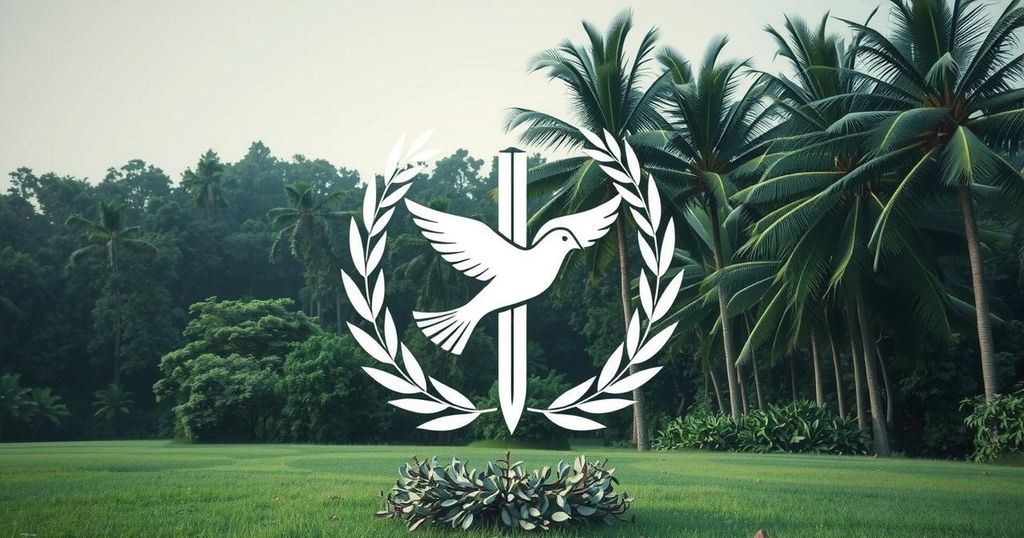Thirteen foreign peacekeepers were killed in the Democratic Republic of Congo during clashes with the M23 rebel group. The United Nations is evacuating non-essential staff from Goma amid escalating violence. International leaders, including French President Macron and the EU’s Kaja Kallas, are calling for an end to the fighting, which has resulted in significant civilian casualties and displacements.
Thirteen peacekeepers were killed in clashes with rebels from the M23 group in the Democratic Republic of Congo. The South African military confirmed that nine of its soldiers were among the deceased while three soldiers from Malawi and one from Uruguay also lost their lives. The violence erupted near the eastern city of Goma, prompting international concern and diplomatic efforts to quell the conflict.
French President Emmanuel Macron communicated with leaders from both DR Congo and Rwanda as calls for an end to the violence intensified. In response to the conflict, the United Nations is evacuating non-essential staff from Goma, where more than one million people reside. The UN Security Council has scheduled an emergency meeting to address the escalating situation, originally planned for Monday but moved to Sunday.
The M23 group has demanded the surrender of Congolese troops in Goma to prevent further bloodshed. Tensions have soared following the murder of a Congolese military governor by the M23, alongside territorial gains by the rebels in key eastern towns. President Macron’s calls for a ceasefire highlight the international community’s growing alarm over the crisis.
The European Union’s foreign policy chief, Kaja Kallas, condemned the M23’s advance and Rwanda’s rumored support for the group. Angolan President Joao Lourenco, acting as the African Union’s mediator, denounced the M23’s actions and called for immediate cessation of hostilities to safeguard civilian lives. The fighting has led to significant displacements, with over 400,000 individuals forced from their homes this year alone.
Local leaders report more than 200 civilian deaths in M23-controlled areas, with hospitals in Goma overwhelmed with patients. Anglican Bishop Martin Gordon expressed his dismay at the protracted violence, stating that the people would do anything for peace. Recent advisories from multiple countries, including the UK and US, urged their citizens to leave Goma amid mounting fears for their safety.
Human Rights Watch has raised alarms regarding the risks to civilians amid escalating hostilities, accusing both the Congolese army and M23 rebels of committing serious abuses. The UN’s assessment underscores that the continuing conflict is exacerbating the humanitarian crisis in the region. The M23, which has been seizing territory since 2021, is perceived as being supported by Rwanda, a claim that remains unconfirmed by Rwandan authorities, though Rwanda alleges that elements within DR Congo are linked to past genocidal activities.
The M23 originated as an offshoot of another rebel faction in 2012, initially purporting to safeguard the Tutsi community in eastern DR Congo. However, critics accuse Rwanda of exploiting the M23 to illegally extract valuable resources from the region.
The Democratic Republic of Congo has been plagued by violence from various armed groups, particularly in the eastern region which is rich in natural resources. Among these groups is the M23, which has been engaged in conflict with Congolese armed forces and has been implicated in significant human rights abuses. The situation has drawn international attention, leading to calls for intervention and peace efforts from various governments and organizations.
The recent conflict in the Democratic Republic of Congo, highlighted by the deaths of thirteen peacekeepers, underscores the urgent need for diplomatic intervention and a resolution to ongoing violence. The M23’s actions have provoked international condemnation and calls for a ceasefire to protect civilians amidst escalating hostilities. As the humanitarian crisis worsens, the global community must urgently address the implications of continued conflict and support efforts to restore stability.
Original Source: www.bbc.com






